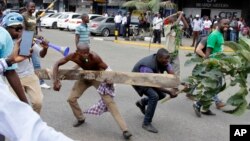As Kenya's opposition party vows to hold protests demanding electoral reforms ahead of a repeat presidential election, the government has issued an order banning such demonstrations in three major cities.
Interior Minister Fred Matiang’i issued the order on Thursday, banning protests in the central business districts of Mombassa, Kisumu, and the capital, Nairobi, citing a "clear, present and imminent danger of breach of peace."
All three cities are strongholds of main opposition candidate Raila Odinga, who is boycotting the October 26 re-vote because the national election board, known by its acronym IEBC, did not replace officials he blames for the irregularities in the earlier election.Thousands of protesters took to the streets in Nairobi Wednesday, a day after Odinga and his NASA coalition announced Tuesday that he will not participate in the re-run of the election.
“We cannot take advantage of that to destroy property and businesses of innocent people, who are going about their innocent daily activities, unless, and it’s important I emphasize this, unless for the leaders who are organizing this, unless it is your intention to destroy the property and the businesses of innocent people, unless it is your intention to hurt innocent people, unless it is your intention to shed blood, it is your responsibility to ensure that when you organize the demonstrations, you stick to the law as provided,” said Matiang’i.
The opposition has been organizing weekly and bi-weekly protests against the electoral commission, and had announced that daily demonstrations would occur next week.
NASA is scheduled to meet with its legal team Thursday, after which its leaders are expected to give a statement.
The IEBC on Wednesday determined that the country’s re-run presidential election will remain scheduled for October 26, after opposition leader Raila Odinga and his NASA coalition announced Tuesday their withdrawal from the race. The IEBC also stated that all eight presidential candidates who participated in the August 8 polls would be eligible to participate again this time around.
In its statement, the IEBC referenced Wednesday’s High Court ruling, in which the judge cleared the path for Thirdway Alliance leader Ekuru Aukot to run in the October 26 election, since he took part in the petition that nullified the previous one.
Odinga argues that according to a 2013 Supreme Court ruling, his withdrawal means that the IEBC must cancel the polls and conduct fresh nominations, which should take place at least 90 days before a general election.
The commission said that it “cannot compel a candidate to participate in an election,” but noted that the law allows a candidate to withdraw his or her candidature via an official form. In the statement, the IEBC said that Odinga and his running mate Kalonzo Musyoka sent a letter on October 10 indicating their withdrawal from the presidential race, but did not submit the form that was required to officially remove their candidacy.




